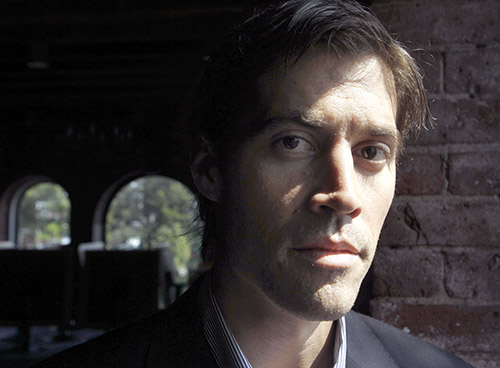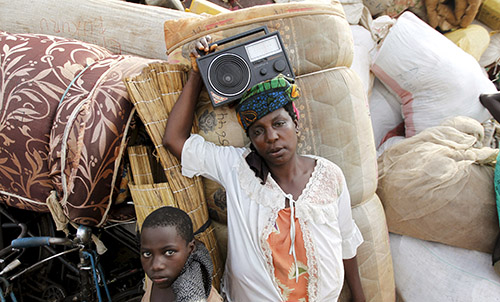Demanding justice and security for journalists in Mexico
CPJ staff were shocked and saddened by the murder of photographer Rubén Espinosa, who was found dead in an apartment in Mexico City along with four women. The victims were shot in the head. Espinosa had fled the state of Veracruz in June and sought refuge in Mexico City, where he thought he would be safe. CPJ condemned the murder and called on authorities to mount a thorough investigation. “It is time for federal and local authorities to take action to combat the serious press freedom crisis facing Mexico,” said Carlos Lauría, senior program coordinator for the Americas. Mexico ranks among the most deadly countries for journalists–with 34 journalists killed for their work since 1992, and another 42 cases in which the motive remains unconfirmed.
CPJ and the PEN American Center followed up with a joint letter to Mexican President Enrique Peña Nieto. The letter was signed by more than 500 prominent journalists and writers, including CPJ board members Christiane Amanpour, Susan Chira, Isaac Lee, David Remnick, and Sandra Mims Rowe. This protest was cited in a powerful New York Times editorial on “The Murder of Mexico’s Free Press.” The Mexican government responded with a statement condemning anti-press attacks and pledging the president’s commitment to freedom of expression. We will keep pushing for results. CPJ reached out to Lydia Cacho, a prominent Mexican journalist and human rights activist, to spearhead an online campaign by Avaaz demanding justice for Espinosa and the other victims. At the time of this writing, the petition had collected more than 600,000 signatures. You can add your voice here.

#RememberingJim and confronting the dangers of reporting in Syria
August 19 marked one year since a video emerged of the beheading of journalist James Foley by Islamic State militants in Syria. Journalist Assistance Associate Nicole Dorit Schilit revisited an audio interview she conducted with Foley in April 2012 on the challenges of being a freelance war correspondent. Deputy Director Rob Mahoney reflected on the aftermath of the tragedy, and on some of the positive changes across the media industry to improve protections for freelancers. This year, CPJ joined forces with news media companies and journalist groups to launch the Global Safety Principles. The statement commits news organizations to treat freelancers on dangerous assignments as they would treat staff. Freelancers in turn pledge to take appropriate training and precautions. So far, some 70 media outlets and press freedom groups have signed on to the Safety Principles, including AFP, AP, BBC, Bloomberg, the Guardian, Reuters, and Vice.
Syria is among the most dangerous conflicts for journalists ever documented, second only to Iraq. At least 84 journalists have been killed, and more than 90 have been kidnapped. We are working to protect local journalists, who face the greatest risks. On August 15, CPJ joined Amnesty International in welcoming the release from prison of Syrian journalist and press freedom advocate Mazen Darwish, who was among the most high-profile political prisoners held by the regime. This month, CPJ and the Rory Peck Trust launched an online resource center pulling together information in Arabic and English on Syria Media Safety. Since 2011, we have provided emergency aid to more than 100 Syrian journalists forced into exile.

Reaching out to help journalists at risk in Burundi
We are working to draw attention to the press freedom emergency in Burundi, which has been wracked by violence and political unrest since President Pierre Nkurunziza announced his unconstitutional bid for a third term this spring. On August 6, CPJ joined with 18 other organizations in urging authorities to investigate attacks on journalists and human rights defenders. On August 26, we published a moving blog about the climate of fear that persists in the country. “Journalists … are targeted by police for one side, protesters and the public on the other side,” one reporter told CPJ. (This journalist, like many others interviewed by CPJ, asked to remain anonymous out of concern for his safety.)
At least 100 journalists have been forced to flee the country in recent months, according to data collected by CPJ and the Burundi Union of Journalists. This media refugee crisis is among the worst we have ever seen. Most Burundian journalists initially sought refuge in Rwanda, where we carried out a high-level mission in July. CPJ Executive Director Joel Simon and Africa Program Coordinator Sue Valentine met with several exiles in Kigali to learn about the challenges they face. The Rwanda Journalists Association is providing a guesthouse and space for exiled journalists to work, but the needs are far greater than any one organization can manage on its own. Our Journalist Assistance team is working with regional and international partners to deliver aid to those journalists who need it most.
Good News:
Germany scores against the surveillance state
CPJ welcomes conviction in murder of Brazilian photographer
Sri Lankan army officers arrested in the case of missing journalist
Media Hits:
The danger of reading the news (“On the Media”)
Blogger hacked to death in Bangladesh is the fourth to be killed in six months (Fusion)
The Pentagon’s dangerous views on the wartime press (The New York Times)
Can anything really be done to protect journalists from murder? (Guardian)
